According to our “A” review of the documentary You Cannot Kill David Arquette, this is firmly a documentary story that inspires profusely. I had the distinct honor and pleasure of speaking to one of the co-directors, David Darg (who helmed the project with Price James) for an exclusive chat about how the project came to be, what makes David Arquette so special as a human being and as a documentarian’s subject, as well as how this film turned a childhood wrestling fan into one who proudly inhaled the mania that is sitting in a crowd that surrounds a ring as two souls battle.
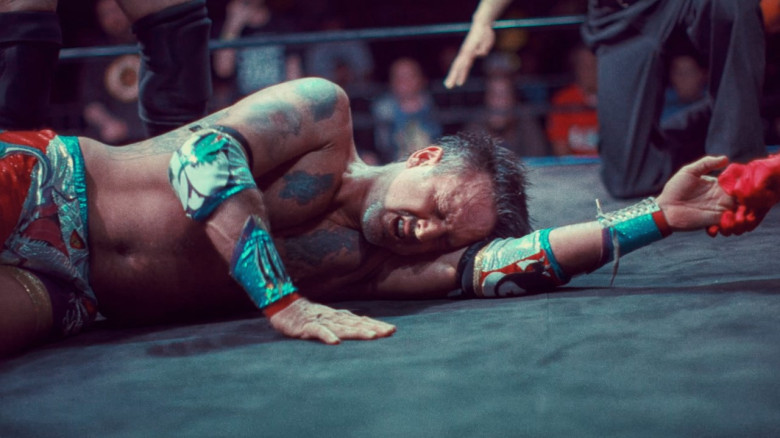
The Movie Mensch: Thanks for reading my review and commenting on it. I’m real excited to talk to you, this was really inspiring.
David Darg: Oh, that’s great to hear, man. That’s what we hope.
The Movie Mensch: There’s a real connection there. I, too, have had heart problems and to see what David was able to do, it really kind of changed things for me. But I got to start at the beginning. What was the Genesis of this project? How did it even get going?
David Darg: So, the Arquette’s have been friends for quite a while. I met them down in Haiti after the earthquake, where we were all involved in a bunch of relief efforts after the big quake in 2010. My career has been as a documentary filmmaker exclusively, and I guess they followed my work after Haiti. David actually came to me with the idea for this film. When he presented the idea, I at that point, had no idea that he had been world champion wrestler. So, I was instantly very intrigued and saw the appeal of it. I loved that I didn’t know his story. I didn’t know that he had fought as the world champion because I don’t think many people know that. I mean, if you’re a wrestling fan, maybe you know that. I think in the general population, very few people would ever imagine that David Arquette as heavyweight wrestling champion. I loved that premise as a starting point for the story. He said, “I’m the most hated person in wrestling, and I hate that because I love wrestling and I want to go on a quest for redemption. I think it will be a great film and I want to honor wrestling,” That was basically all he said. So, I initially loved the idea, of course, because it just sounded like a lot of fun. I knew that it had a lot of potential to be a great story because the premise was an underdog story. He was making an effort to climb back from the absolute bottom. Whenever you’re the most hated person in anything, it’s going to be a good story.
The Movie Mensch: Now the thrill, I would think, of making a documentary, is the subject kind of dictates the film. It can go anywhere. It’s almost like trying to predict chaos. First, how did the unpredictable ability of what David was going through enhance your narrative? And two, is that one reason why you like working in this milieu?
David Darg: Yeah, I think the unpredictability was nerve-wracking at first because when he came initially with the idea, he was extremely overweight. He just recently had the heart attack. So, what he was proposing was very unlikely. It was like, “I’m going to get into shape. I’m going to work my way from the bottom all the way to the top. I’m going to redeem myself.” It sounded like an impossible dream. As a filmmaker, the idea of what someone’s trying to achieve is often entertaining and enticing, but you don’t know for sure whether they’re going to be able to accomplish it. But you have to take a leap of faith with them in saying, “Okay, I love the idea that you’re going to try to do this, and I want to take a gamble and start working, assuming that you might be able to do this.” It was very unpredictable, of course. Then, when you set off, you never know what’s going to happen. But I knew that something this weird and crazy and fantastic had the potential to go in lots of different directions. And, when you see the film, of course, you see that it does go in lots of different directions. So, it was a success from that perspective.
The Movie Mensch: Yeah. I’d never expected to wind up on the streets of Tijuana with David wrestling in the streets. I’ve been there many times. How crazy was that to film? Talk about unpredictable, that almost defines that city.
David Darg: It was really, really crazy, really intense. I mean, fortunately, myself and the co-director, Price, are run and gun filmmakers, so we’re used to shooting on the fly in crazy situations. A lot of my documentary work has come out of disasters. I was nominated for an Oscar in 2016 for a film made in the Ebola Zone (Body Team 12), which was harrowing and insane, so nothing really phases me. But yeah, the Tijuana traffic is almost as dangerous as being in the Ebola Zone.
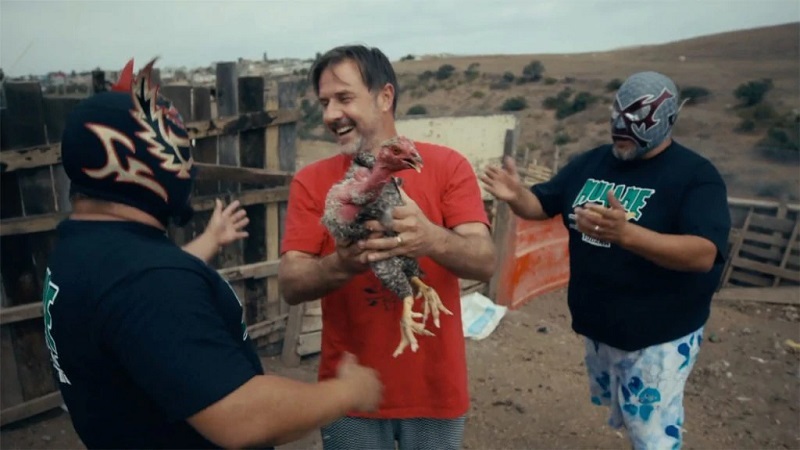
The Movie Mensch: There’s a still I think, it’s in my You Cannot Kill David Arquette review, where he’s mid-air and there’s just a line of cars behind him. It’s visually perfect. How was David to work with? I know he’s on a mission when you’re working alongside them, but as a person, what was the big takeaway?
David Darg: My big takeaway with David is, he’s the most non-celebrity celebrity I’ve ever encountered. I’ve had the privilege of working with lots of people that are in the spotlight, and David just doesn’t feel like anyone else that I’ve ever worked with or met. He’s the most down-to-earth person I’ve ever met. He’s happy to just interact, engage with anyone at any time. He’s very grounded in that sense and very eager to do whatever it takes to get the job done. I think the film’s an obvious testament to that drive. Any suggestion we had. He was down to let us play with the ideas in this film. He wasn’t trying to dictate how we did anything, he just said, “I’m a blank slate, do whatever you want.” I think that you see that in the film with some of the access that we have—some of the very dark and personal moments that are very rare, to peer behind the curtain into the life of someone going through an addiction, especially someone with his status, is quite a rare thing to see on film I think.
The Movie Mensch: That had to reinforce that overcoming obstacles fight to get to the top mentality that is at the center of your narrative.
David Darg: Yeah, I think it was just a really brave thing for him to do. To let the cameras into certain parts of his life. We as filmmakers pushed him to say, “It’s great that you want to do this. We understand on the surface why you want redemption in the ring, but we knew that there were much deeper issues that were driving his quest for being accepted. His quest for getting back into shape. Ultimately, he was wrestling with a lot of demons. So, the film needed to take a much deeper dive than just be a film about wrestling, and it’s certainly not that. It’s a film about life, and it’s a film about the struggle and the tragedy of celebrity, in many ways.
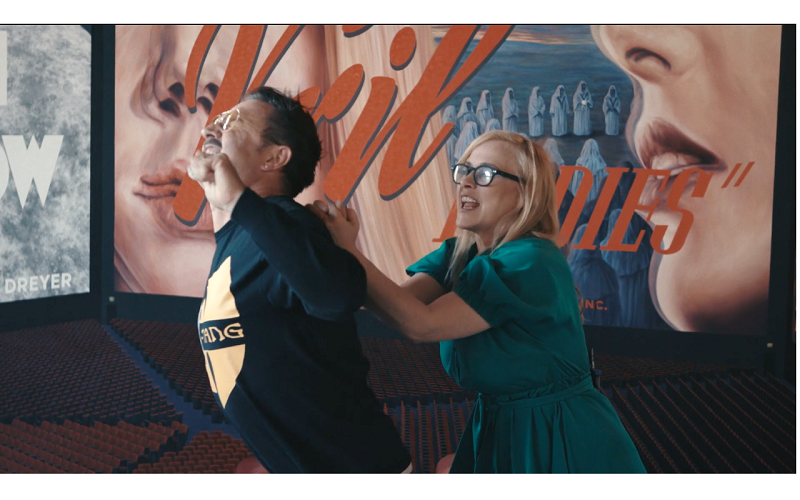
The Movie Mensch: Integral to that, I think would also be the participation of his family. I mean they, at least from afar, they seem like one really tight-knit clan. Was there any hesitation by anybody, including his ex-wife, Courteney Cox, his daughter (Coco) or sisters (Patricia and Rosana Arquette), or was everybody just there to be there for David?
David Darg: Everyone’s super supportive of David and were very willing to participate. I think supportive, in the sense that they were open to us interviewing them and getting their perspective on it. They weren’t necessarily as supportive of David’s desire at the beginning, you see his daughter in the film, of course, being completely against the idea of her dad getting into wrestling, just completely embarrassed. And so, we wanted to show that too, that reality, that it doesn’t matter who you are, your own kids can be embarrassed of you. He was wrestling with being the most hated man of wrestling, and also there’s the struggle of having a win over his own family, and to accepting that there was something real that he needed to do.
The Movie Mensch: For me, one of the most indelible images in the entire movie is his daughter flipping the bird to his competitor in the ring, and I’m like, “That is a 180, man.”
David Darg: Yeah, total 180. And we knew that it would happen, and so we had a camera just trained on his daughter for that fight because we were expecting that she would. It happens to a lot of people. It happened with me. I wasn’t necessarily a huge wrestling fan going into this project. I watched it as a kid and it was quirky and fun, but when I started going on the road with David and figuring out all these wrestling matches, I almost became a super fan. I see the appeal of it now. I see the theatrics of it. The passion and the fun. When you’re in those matches, it’s so exciting. They really get caught up in it. We knew that of course on paper, his daughter would assume that this would be the most embarrassing thing ever, to have your dad wrestle. When you see the work that he did, we expected that she would have that turn, and so that’s why we had a camera on her the whole match! It definitely paid off, because that is a great where she’s flipping the bird and getting totally engaged.
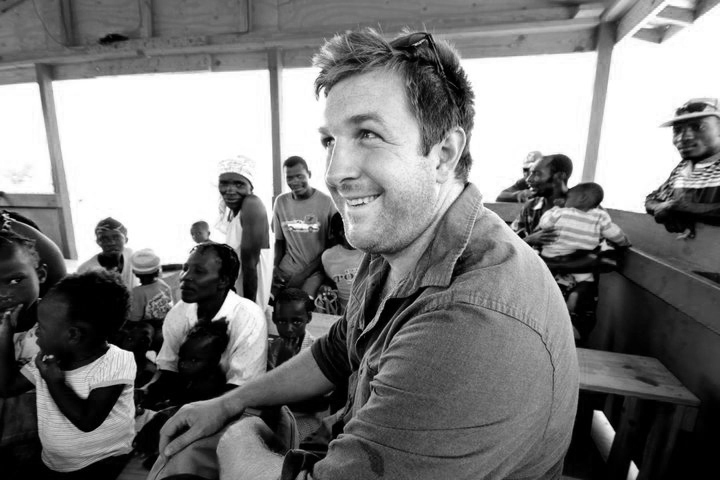
The Movie Mensch: What made you want to get into documentary filmmaking in the first place?
David Darg: That’s a really good question. I come from a third-generation photographer, and filmmaker family, so cinematography and capturing images runs in my family. I initially started telling stories driven by my love of humanity. I was doing a lot of humanitarian work… hence me being in Haiti for the earthquake and a lot of my documentary storytelling came out of necessity I was trying to raise money and tell important stories about people that needed help and focus on stories about heroes and under-reported stories as well. My documentary work came out of essential storytelling. After a long time, I think I needed to change directions just a little bit to start to branch out and have a little fun because I love comedy as well—so this definitely appealed to me. It was a big departure from my traditional type of doc, I mean, you can tell by the Ebola doc, it’s very hard-hitting, very serious. I think that with this film, although it has a lot of quirkiness and comedy at its core, there’s a lot of my signature, which is looking for the real emotion and the real heart and the spirit and the human condition behind it.
The Movie Mensch: What, in your estimation, makes a good subject?
David Darg: That’s a great question too. Everyone’s got a story to tell. I think a good filmmaker could make a great film about anybody. The best subjects are the ones that are doing something that no one else can do because your audience is naturally drawn to their achievement. And so, my Ebola documentary, it was about a nurse collecting dead bodies on the streets of Africa, at a time that everyone else was running away, doing jobs that nobody wants to do, or people willing to sacrifice themselves for the good of others and that type of thing. But in David’s case, I mean, it’s a story of someone that’s willing to risk their life. I mean, you see in the film, he almost does, and is willing to risk it all for the sake of reclaiming a dream that he’s always had. [He is] reclaiming his health, reclaiming his mental health, and getting his life back on track. There’s a lot of reasons why David makes a perfect character, apart from his celebrity. His drive to fight, it’s so inspirational and just makes for a perfect character in this case.
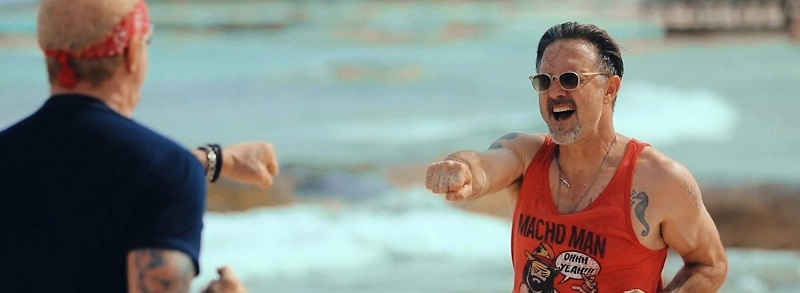
The Movie Mensch: Any tips for someone who has a story that they want to get out to society like this?
David Darg: I think not enough people are telling their own story with the means that we have available now. I think filmmaking has become very democratized with the technology. So many people have the means to do storytelling these days, all around us. I’m sure you’ve got friends and family that have got cameras, maybe you’ve got your own cameras. I just don’t think there’s enough self-publishing going on. I think people are daunted by the idea of storytelling and making a documentary. With all the platforms available, [they are] hungry for content. There’s a lot of opportunity out there.

